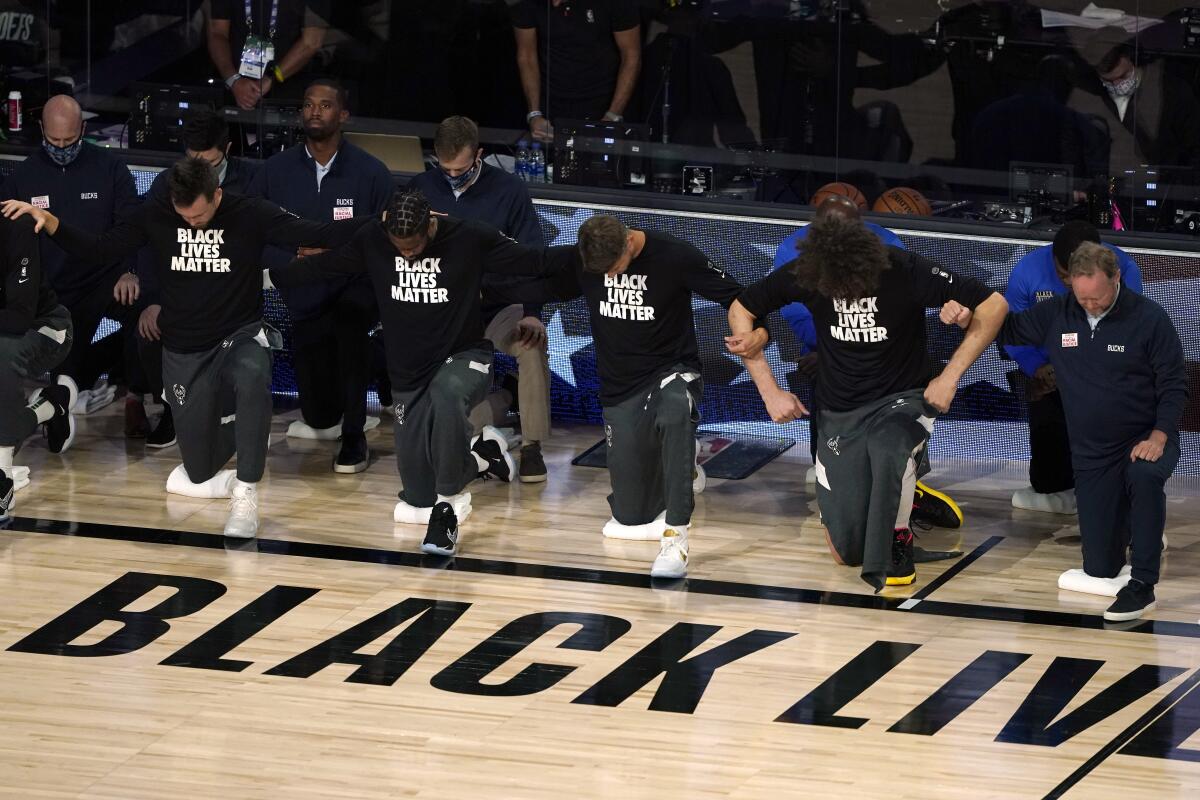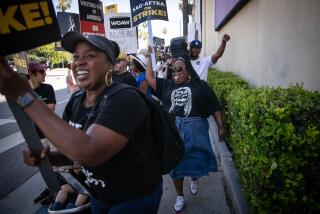The grim double consciousness Black NBA players must navigate

- Share via
James Baldwin in his essay “A Talk to Teachers” wrote that the Black student who becomes aware of his relationship to American society risks psychological alienation. Once when a group of Black college students chuckled at this line during a public discussion, Baldwin dug in and pressed them to pick up and repurpose the tools of power with their own intention.
Last week, the NBA players took up those tools. At least for the moment, the dust has settled on the players’ playoff strike. After negotiations with league ownership, the players, 81.9% of whom are people of color, have decided to return to the court. But the terms of their peace speak to just how psychologically difficult, perhaps untenable, is their relationship to America and specifically its capitalist bedrock.
In the wake of the Jacob Blake shooting, Milwaukee Bucks guard George Hill vented that the players “shouldn’t even have came to this damn place.” He was referring to the so-called NBA bubble, the sports complex in Orlando, Fla., used for the final months of the season.
In managing to keep COVID-19 at bay while producing a high-quality event, the NBA’s hermetically sealed venue has showcased the best attributes of American capitalism: boldness, innovation and the nonpareil talents of the players themselves. But it has also sealed the athletes in an artificial environment where they are cut off from people capitalism has deemed too unimportant to protect.
Jared Kushner, President Trump’s son-in-law, dismissed the strike as a night off from work for a bunch of financially fortunate workers. Yes, it is easier to protest from a position of privilege, but that is true of the athletes only to the extent that one is willing to ignore the psychic cost of being protected and Black.
These are young Black men whose job it is to entertain the American public in cloistered environs while other young Black men and women who share their background are assaulted or murdered on video in the public square. It’s hard to overstate the double consciousness required to perform awe-inspiring athletic feats while witnessing in unending replay the images of Blake being shot seven times in the back by police and paralyzed from the waist down.
This double consciousness is built into the troubled relationship of Black people to capitalism itself. “Do you know why people like me are shy about being capitalists?” the writer Jamaica Kincaid asked. “Well, it’s because we, for as long as we have known you, were capital, like bales of cotton and sacks of sugar, and you were the commanding, cruel capitalists.”
The same capitalist system that’s made Michael Jordan a billionaire and LeBron James the most popular American athlete of this era has for seven decades rendered Black Americans unemployed at twice the rate of whites regardless of booms and busts.
While NBA players earn $7.7 million a year on average, more than one-fifth (20.8%) of Black Americans live in poverty, according to the 2018 U.S. Census Bureau statistics, a rate eclipsed only, and not coincidentally, by Native Americans (25.4%). The same America that exalts the talents of Stephen Curry warehoused 465,200 Black people in its prisons in 2018, while jailing hundreds of thousands more for nonviolent drug offenses and even lesser violations.
The stand that the players took was powerful and right. LeBron James and others are doing Baldwin’s work by repurposing the tools of a system made to degrade them for other ends.
That the players were able to negotiate for NBA arenas to be opened as polling places for the November election suggests the power that they can wield if they are willing to linger in the breach between their privilege and the plight of millions of their people.
Maybe all American workers should match their boycott, turning away from our jobs to protest injustice so that the burden doesn’t rest only on the athletes. But they occupy such a uniquely difficult and blessed position that they are called to and can do more, whether it be extending the boycott, or pushing the NBA ownership’s investment in black-owned businesses, which have suffered tremendously in the pandemic, or simply insisting that the NBA not limit the protest words players can put on their jerseys. Business as usual, capitalism as usual, should not be an option.
It is past time that Black athletes realize and live in their power. I’m well aware of the costs that they will incur. My uncle Charles Anthony was a linebacker at USC and for the Chargers. My cousin, the defensive coordinator for the Canadian Football League’s Saskatchewan Roughriders, played pro football, too, and recently wrote an article about his experiences of racism in the United States. My father, Calvin Norris, a decorated college sprinter, was expelled from Fresno State in 1970, his deferment lost, his draft number called, for protesting the injustices of his time.
That such injustices and the psychic rifts that they create for Black athletes and Black professionals in general persist more than 50 years on is a national shame. In the midst of a pandemic and political and economic upheaval, the way forward is even more fraught than in the 1960s, but it too exists.
Keenan Norris is an assistant professor of English at San Jose State University and author of the novel “Brother and the Dancer.”
More to Read
A cure for the common opinion
Get thought-provoking perspectives with our weekly newsletter.
You may occasionally receive promotional content from the Los Angeles Times.









